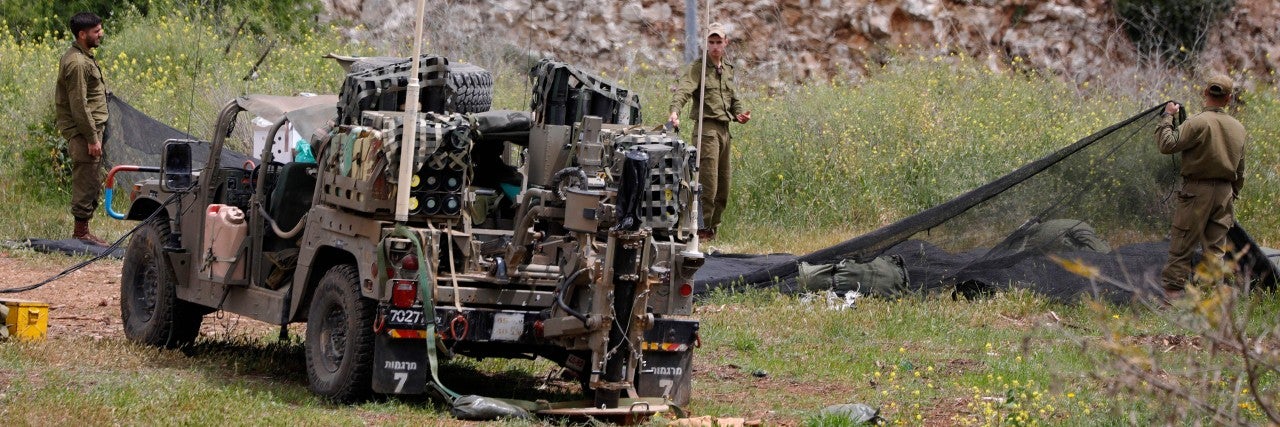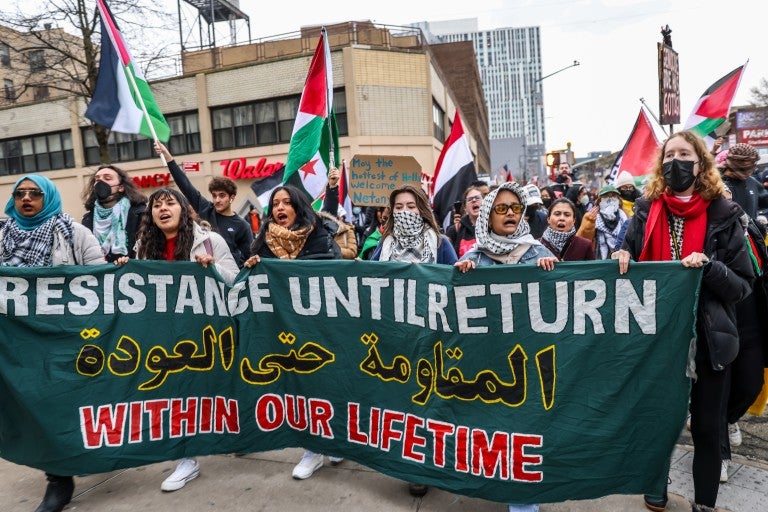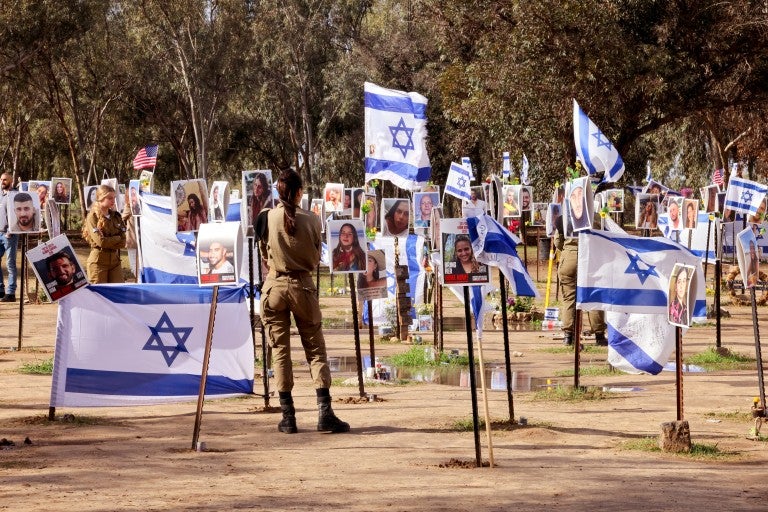July 21, 2023
As the world watched Israel try to defuse Iran-backed terrorists in the West Bank earlier this month, another proxy for Iran, the Hezbollah terror group, was busy stoking tensions along the Israeli-Lebanese border. Here’s what you need to know about these provocations, who’s behind them, and why.
More than four decades of terror threats
Terrorist groups operating in Lebanon have posed an ongoing threat to Israel for more than four decades. In March 1978, Palestinian terrorists based in southern Lebanon murdered 37 Israelis, including 13 children, and wounded nearly 80 others. To thwart more attacks and better secure northern Israel, Israel Defense Forces (IDF) launched Operation Litani and entered southern Lebanon, reaching the Litani River to prevent terror attacks.
Claiming it had no ties to the Palestinian terrorists operating within its borders, the government of Lebanon protested the Israeli invasion. The U.N. Security Council (UNSC) responded by adopting Resolution 425, which called on Israel to withdraw its forces from all Lebanese territory and established the United Nations Interim Force In Lebanon (UNIFIL) to confirm Israel’s withdrawal, restore international peace and security, and assist the Lebanese government in ensuring the return of its effective authority in the area.
When terrorist attacks from Southern Lebanon continued, Israel was compelled to launch a large-scale military operation in June 1982 known as the First Lebanon War.
Resulting from the sectarian chaos of Lebanon’s civil war and Iran’s 1979 Islamic Revolution, a new terrorist group formed by Shi’ite Muslim radicals emerged in Lebanon in 1983, based on Iranian Supreme Leader Ayatollah Khomeini’s vision. The name chosen by Khomeini was Hezbollah, or Party of God.
While Israel complied with Resolution 425 in May 2000 by withdrawing its troops from Lebanon, the Lebanese government had still not fulfilled its responsibilities: it has neither helped restore internal peace and security nor assisted UNIFIL in establishing its effective authority in the area.
Hezbollah’s History of Terrorism
Hezbollah has since modeled how to become a hybrid terrorist organization with different wings that front for what it really does. These so-called wings – social welfare, political, and military – give Hezbollah the veneer of a legitimate Lebanese party purportedly working to defend Lebanon. Other terror groups such as Hamas have borrowed this model.
Meanwhile, Hezbollah perpetrated the 1983 bombing against the U.S. embassy in Beirut, which killed 63 people, and, in the same year, carried out the gruesome bombing of the U.S. and French barracks of the Multinational Force in Lebanon, killing 241 American and 58 French soldiers. Globally, Hezbollah was involved in the bombings of the Israeli Embassy in Buenos Aires in 1992 and the AMIA building in 1994, which together killed 114 civilians and injured scores more.
On July 12, 2006, Hezbollah attacked an Israeli patrol across the Lebanese-Israeli border, killing three soldiers, severely wounding two, and abducting two others who were later confirmed dead. This unprovoked attack sparked large-scale hostilities known as the Second Lebanon War. The fighting ended on August 14, three days after the United Nations Security Council adopted resolution 1701, which called for a “full cessation of hostilities.”
It also called on the Lebanese government to oversee the dissolution and disarmament of militias and called for an embargo on the sale or supply of arms and related material to Lebanon, except as authorized by its government.
But by then, Hezbollah had created a political wing that along with its allies gained a large majority of the popular vote in Lebanese parliamentary elections. In fact, Hezbollah has such a tight grip on the Lebanese government that it decides which candidates may run for the presidency.
Iran and Syria have continued their shipments of deadly weapons to Hezbollah, and since the 2006 hostilities, Hezbollah has increased its military more than tenfold, including in Southern Lebanon, across the region, and around the globe.
Hezbollah has supported the Assad regime’s murderous campaign against the Syrian people and has exacerbated sectarian and ethnic tensions in Lebanon. In 2012, its operatives perpetrated a terror attack in Burgas, Bulgaria, killing five Israeli tourists and a Bulgarian driver. And in August 2020, a huge explosion in the Beirut Port attributed to Hezbollah killed hundreds.
To this day, Lebanon has not extended effective control over southern Lebanon, as the UN called upon it to do in 1978, 2002, 2003, and 2006.
What is Hezbollah doing to provoke Israel?
In recent months, Hezbollah has perpetrated a series of provocations against Israel. In March, a terrorist operative infiltrated Israel from Lebanon, evading border patrols and remote detection systems. After traveling 60 kilometers south to the Megiddo Junction in northern Israel, he planted a sophisticated explosive device typically used by Hezbollah, which seriously wounded an Arab Israeli citizen. He then hitched a ride from a passing car while security forces led a manhunt. When authorities stopped the car near the border, the driver exited the vehicle, but the terrorist refused. Armed with an explosive belt and other weapons, he was soon shot dead.
On April 6, 34 rockets were launched from southern Lebanon into Israel, the most significant volley since the 2006 war. The Israeli military stated that the attacks were carried out by the Palestinian terrorist group Hamas, whose leader Ismail Haniyeh had met with Hezbollah secretary-general Hassan Nasrallah in Lebanon the previous day. The rockets were fired from an area that Hezbollah effectively controls.
Two days later, Hezbollah built a tent about 30 meters inside Israeli territory near a UN position at the Mount Dov area, a contested area between Israel’s Golan Heights and Lebanon, also known as Shebaa Farms. The IDF responded by dropping leaflets warning individuals not to cross the border. However, on May 30, another tent was erected 55 meters inside Israel.
In 2020, responding to Hezbollah’s growing presence and provocations, the IDF began constructing a ground barrier that has reached Mount Dov, eliciting Hezbollah-sponsored protests from residents of nearby villages.
Last month, the Lebanese newspaper al-Akhbar reported that the “resistance” had erected a structure to stop the IDF work. On July 12, the anniversary of the beginning of hostilities between Israel and Hezbollah in 2006, three members of Hezbollah were wounded when they tried to “sabotage the Israeli security fence.”
What is the role of Iran?
Iran-backed terror organizations have attacked Israel from multiple fronts in recent months. Rockets have been fired from inside Syria, Lebanon, the West Bank, and Gaza. This military boxing maneuver of sorts coincides with intense debates in Israel over judicial reforms.
While it’s impossible to get inside the minds of terrorists, Hezbollah and others may view the intense internal disagreements in Israel as a sign of weakness and an opportunity to escalate their activities against the Jewish state.
Iran’s Supreme Leader Ayatollah Khamenei has emphasized this, saying he believes the “Zionist regime” was disappearing faster than he thought.
“They say their collapse is nearing and that they won’t make it to their 80th birthday. We said a few years ago [in 2015] that they wouldn’t reach the next 20 or 25-year point from then. But they themselves are in a rush and want to leave sooner,” he said.
Similarly, Hezbollah leader Hassan Nasrallah has also echoed this sentiment, saying, “Everything that is happening in Israel is among the signs of the end of this entity.”
What is the role of the international community?
Once again, in August, the UN Security Council will convene to renew the UNIFIL mandate as it does every year. While Israel always supports the renewal of UNIFIL’s mandate, it has been unable to fulfill it for many years, as Hezbollah often prevents its peacekeepers from entering villages which are used for Hezbollah’s terror activities.
Unless the Council takes the necessary measures to ensure that its resolutions regarding Lebanon are upheld, UNIFIL’s mandate will remain unfulfilled.
What are those measures? Hezbollah has demonstrated that it’s a threat to peace and security in the region and around the world. It is the main impediment to the fulfillment of UNIFIL’s mandate. The UNSC must use the powers conferred upon it by the UN Charter, including the power to impose sanctions on rogue organizations and their state sponsors, to uphold its resolutions regarding Lebanon.
As AJC has been saying for years, Hezbollah is a global terrorist organization. AJC calls on EU member states and other members of the international community to designate Hezbollah as a terrorist organization in its entirety. In fact, many countries already have made this full designation, including the U.S., United Kingdom, Netherlands, Germany, Guatemala, Colombia, Canada, Kosovo, Lithuania, Serbia, Israel, Argentina, Honduras, Paraguay, Gulf Cooperation Council, and Arab League.
In 2019, AJC and the Institute for Counter-Terrorism (ICT) produced a fact-based analysis of the dangers posed by Hezbollah to the Lebanese people, Europe, Latin America, and the international community. Titled “Setting the Record Straight,” the report breaks down how misconceptions and propaganda allow the terror group to literally get away with murder. It also demonstrates how designating all of Hezbollah’s wings as a terror group would serve to strengthen Lebanon, protect the West, and promote stability across the Middle East.
Urge your members of Congress to cosponsor bipartisan resolutions soon to be introduced by U.S. Reps. Brad Schneider (D-IL) and Gus Bilirakis (R-FL) and U.S. Sens. Jacky Rosen (D-NV) and Marsha Blackburn (R-TN) calling on the EU to designate the entirety of Hezbollah as a terror organization.


